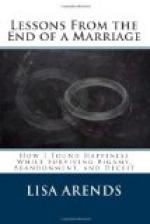Love is the mightiest force in creation. It will not be gainsaid. But it can be controlled. To pen it up too completely brings explosion, devastation. To give it too free rein means madness with no less devastation. To direct it within reasonable limits is the only safe way.
It takes a cool head and steadfast heart to meet such emergencies as A.J.’s. And eye hath not seen nor ear heard the “Well done” and its attendant glory, which enters into the heart and character of the man who meets such condition and conquers—himself. Not once in a thousand lives has a man such opportunity to prove his godship and bless himself and the world.
CHAPTER IX.
THE LAW OF INDIVIDUALITY.
All growth is by learning.
All learning comes by the gratification of desire. Truly, experience is not only the best teacher, but the only infallible one.
The gratification of desire, good or bad, leaves always one imperishable residue of wisdom. The rest of the experience goes with the chaff for burning.
Desire points invariably according to the individual’s intelligence. In proportion as this is faulty his desires are “bad.”
What is a bad desire, anyway? In the main “bad” desires are self-made or thoughtlessly accepted. Dancing is wicked to a Methodist and “good” to an Episcopalian.
But aside from these personal standpoints which are legion there is an immutable Law, to which intelligence is conforming all action and thought—the Law of Individuality—the Law recognized and expressed by Confucius and Jesus in negative and positive forms of the “golden rule”; “Do not unto others what ye would not they should do unto you.”
Interference with the freedom of the individual is “bad”—that is, it invariably brings pain to the one who interferes, in thought or deed. Listen to this:
“You cannot know anything of the sources or causes of the crisis you are judging, for no one who knows will tell you, and you would not know if you were told. The depths of elemental immortality, of self-deceit and revenge, lie in our eagerness to judge one another, and to force one another under the yoke of our judgments. When there is the faith of the Son of man in the world, life will be left to make its own judgments. The only judgment we have a right to make upon one another is the free and truthful living of our own lives.” George D. Herron.
This forcing of others, in mind or action, under the yoke of our judgment is the only possible way we can break a real Law. To be ourselves and to leave others free is to “be good.” Dancing will come and go, and come again; so will fashions of all kinds; conventionalities and creeds; but this Law remains an eternal chalk line to be toed. And eternal torments await him who does not toe it.




